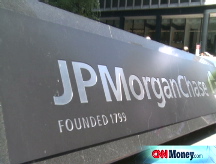Local banks fail in Illinois, Michigan
Two banks are closed by state officials and FDIC is named receiver.
NEW YORK (CNNMoney.com) -- Two regional banks were closed by state regulators Friday as the downturn in the housing market continues to strain local lenders.
A total of 15 federally-insured institutions have been closed so far this year.
Michigan-based Main Street Bank and Meridian Bank in Illinois were both closed and the Federal Deposit Insurance Corporation was named receiver, according to FDIC statements.
Main Street Bank's deposits will be transferred to Monroe Bank & Trust and the failed bank's two offices will reopen Saturday as Monroe branches.
Meridian's four offices and all deposits will be taken over by National Bank and will reopen under new management on Saturday.
The FDIC said customers of both banks will still be insured with their new institution and do not need to change their banking relationship to retain deposit insurance.
"This is a good deal for customers -- no depositor will lose a penny," said Ken Ross, Commissioner of the Michigan Office of Financial and Insurance Regulation (OFIR), which closed Main Street.
"The dramatic downturn in the residential real estate market unfortunately knocked the wind out of this institution, despite the best efforts of a creative management team," Ross said in a statement.
Monroe Bank & Trust has agreed to pay a total premium of 1 percent for the failed bank's $86 million deposits. It will also purchase approximately $16.9 million of Main Street's $98 million in total assets.
Meridian Bank had total assets of $39.18 million in total assets and $36.88 million in total deposits as of September. National Bank will purchase approximately $7.55 million of Meridian's assets, and did not pay the FDIC a premium.
The FDIC will retain the remaining assets for both failed banks.
The cost to the Deposit Insurance Fund for both bank failures will range between $46 million and $53.5 million, the FDIC estimates.
Also on Friday, the FDIC formally approved the increased insurance limit of $250,000 per regular account that was part of the financial rescue legislation enacted last week. The previous limit was $100,000.
The move comes amid a recent spate of bank failures that have made many Americans nervous. Last month, savings and loan giant Washington Mutual went under in what was the largest bank failure in history.
David Barr, an FDIC spokesman, said the new limits were in effect as of Oct. 3 when the president signed the law authorizing them. ![]()



